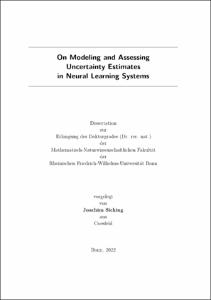On Modeling and Assessing Uncertainty Estimates in Neural Learning Systems

On Modeling and Assessing Uncertainty Estimates in Neural Learning Systems

| dc.contributor.advisor | Wrobel, Stefan | |
| dc.contributor.author | Sicking, Joachim | |
| dc.date.accessioned | 2023-04-20T12:26:52Z | |
| dc.date.available | 2023-04-20T12:26:52Z | |
| dc.date.issued | 20.04.2023 | |
| dc.identifier.uri | https://hdl.handle.net/20.500.11811/10778 | |
| dc.description.abstract | While neural networks are universal function approximators when looked at from a theoretical perspective, we face, in practice, model size constraints and highly sparse data samples from open-world contexts. These limitations of models and data introduce uncertainty, i.e., they render it unclear whether a model's output for a given input datapoint can be relied on. This lack of information hinders the use of learned models in critical applications, as unrecognized erroneous predictions may occur. A promising safeguard against such failures is uncertainty estimation, which seeks to measure a model's input-dependent reliability. Theory, modeling, and operationalization of uncertainty techniques are, however, often studied in isolation. In this work, we combine these perspectives to enable the effective use of uncertainty estimators in practice. In particular, it is necessary to address (the interplay of) three points. First, we need to better understand the theoretical properties of uncertainty estimators, specifically, their shortcomings stemming from constrained model capacity. Second, we must find a way to closely model data and error distributions that are not explicitly given. Third, for real-world use cases, we need a deeper understanding of uncertainty estimation requirements and their test-based evaluations. Regarding the first point, we study how the estimation of uncertainty is affected (and limited) by a learning system's capacity. Beginning with a simple model for uncertain dynamics, a hidden Markov model, we integrate (neural) word2vec-inspired representation learning into it to control its model complexity more directly and, as a result, identify two regimes of differing model quality. Expanding this analysis on model capacity to fully neural models, we investigate Monte Carlo (MC) dropout, which adds complexity control and uncertainty by randomly dropping neurons. In particular, we analyze the different types of output distributions this procedure can induce. While it is commonly assumed that output distributions can be treated as Gaussians, we show by explicit construction that wider tails can occur. As to the second point, we borrow ideas from MC dropout and construct a novel uncertainty technique for regression tasks: Wasserstein dropout. It captures heteroscedastic aleatoric uncertainty by input-dependent matchings of model output and data distributions, while preserving the beneficial properties of MC dropout. An extensive empirical analysis shows that Wasserstein dropout outperforms various state-of-the-art methods regarding uncertainty quality, both on vanilla test data and under distributional shifts. It can also be used for critical tasks like object detection for autonomous driving. Moreover, we extend uncertainty assessment beyond distribution-averaged metrics and measure the quality of uncertainty estimation in worst-case scenarios. To address the third point, we need not only granular evaluations but also have to consider the context of the intended machine learning use case. To this end, we propose a framework that i) structures and shapes application requirements, ii) guides the selection of a suitable uncertainty estimation method and iii) provides systematic test strategies that validate this choice. The proposed strategies are data-driven and range from general tests to identify capacity issues to specific ones to validate heteroscedastic calibration or risks stemming from worst- or rare-case scenarios. | de |
| dc.language.iso | eng | |
| dc.rights | In Copyright | |
| dc.rights.uri | http://rightsstatements.org/vocab/InC/1.0/ | |
| dc.subject | Neuronale Netze | |
| dc.subject | Unsicherheitsschätzung | |
| dc.subject | Vertrauenswürdiges Maschinelles Lernen | |
| dc.subject | Deep Learning | |
| dc.subject | Uncertainty Estimation | |
| dc.subject | Dropout | |
| dc.subject | Safe Machine Learning | |
| dc.subject.ddc | 004 Informatik | |
| dc.title | On Modeling and Assessing Uncertainty Estimates in Neural Learning Systems | |
| dc.type | Dissertation oder Habilitation | |
| dc.publisher.name | Universitäts- und Landesbibliothek Bonn | |
| dc.publisher.location | Bonn | |
| dc.rights.accessRights | openAccess | |
| dc.identifier.urn | https://nbn-resolving.org/urn:nbn:de:hbz:5-70545 | |
| dc.relation.arxiv | 2204.13963 | |
| dc.relation.arxiv | 2007.05434 | |
| dc.relation.arxiv | 2101.02974 | |
| dc.relation.arxiv | 2101.02726 | |
| dc.relation.doi | https://doi.org/10.1007/s10994-022-06230-8 | |
| dc.relation.doi | https://doi.org/10.5220/0010821800003122 | |
| ulbbn.pubtype | Erstveröffentlichung | |
| ulbbnediss.affiliation.name | Rheinische Friedrich-Wilhelms-Universität Bonn | |
| ulbbnediss.affiliation.location | Bonn | |
| ulbbnediss.thesis.level | Dissertation | |
| ulbbnediss.dissID | 7054 | |
| ulbbnediss.date.accepted | 14.04.2023 | |
| ulbbnediss.institute | Mathematisch-Naturwissenschaftliche Fakultät : Fachgruppe Informatik / Institut für Informatik | |
| ulbbnediss.fakultaet | Mathematisch-Naturwissenschaftliche Fakultät | |
| dc.contributor.coReferee | Bauckhage, Christian | |
| ulbbnediss.contributor.orcid | https://orcid.org/0000-0003-1741-2338 | |
| ulbbnediss.contributor.gnd | 1288795904 |
Files in this item
This item appears in the following Collection(s)
-
E-Dissertationen (4104)




